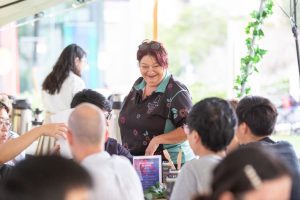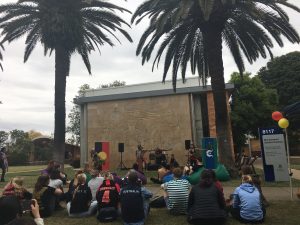4 Engaging with Aboriginal and Torres Strait Islander Peoples
The ability to know how to appropriately engage is an important skill for developing genuine, positive and quality relationships with Aboriginal and Torres Strait Islander peoples. Colonisation and its continuing effects have adversely impacted on relationship-building between Aboriginal and Torres Strait Islander and non-Indigenous peoples. Positive engagement with Aboriginal and Torres Strait Islander peoples requires being aware of the history of colonial relations so that respectful relationships can be built from shared positions of power, understanding and responsibility. In this way, relationships with Aboriginal and Torres Strait Islander peoples can maintain the cultural principle of reciprocity, whereby that which is given in an engagement is returned with equal value.
In the absence of such respect, relationships between Aboriginal and Torres Strait Islander and non-Indigenous peoples are maintained as transactions in which the benefit of engagement favours non-Indigenous people and what they seek from the relationship. When relationships are continuously conducted in a transactional manner, engagements become exhausting for Aboriginal and Torres Strait Islander peoples because there is an unspoken expectation that Aboriginal and Torres Strait Islander peoples do the disproportionate amount of work in the engagement. Aboriginal and Torres Strait Islander peoples constitute the minority within society and hold differential positions of power, usually having less authority than non-Indigenous peoples.
Transactional relationships that only benefit non-Indigenous peoples mean that non-Indigenous needs are always met. In addition, engagement practices that are dependent on meeting non-Indigenous outcomes deny the building of quality and respect in relationships. Aboriginal and Torres Strait Islander peoples are denied the ability to be truly human and equal to non-Indigenous people. These types of engagements are ultimately not beneficial for either group and replicate practices of colonisation in which Aboriginal and Torres Strait Islander peoples only exist to serve non-Indigenous peoples. It is critical that engagements move away from the transactional towards an understanding of Aboriginal and Torres Strait Islander ‘Ways of knowing, ways of being and ways of doing’ (Karen Martin, Noonuggal, Gwandamoopa and Pitjara, 2008, Please Knock Before You Enter). Developing such an understanding can allow relationships between Aboriginal and Torres Strait Islander peoples and non-Indigenous peoples to become more respectful and reciprocal so that Indigenous needs can also be met and quality relationships can be retained for the future. In this way, engagements move towards greater senses of reconciliation between Aboriginal and Torres Strait Islander and non-Indigenous peoples.
In building stronger relationships with Aboriginal and Torres Strait Islander peoples, it is important to understand your own beliefs, biases, stereotypes and views. Watch the two videos below to learn more about racism and bystander action against racism.
What does Racism and Bystander Action against Racism look like?
Watch What is racism? (YouTube, 9m55s) as Professor Tracey Bunda (Academic Director, Aboriginal and Torres Strait Islander Studies Unit), Associate Professor Sandra Phillips (Associate Dean, Indigenous Engagement, Faculty of Humanities and Social Sciences) and Dr Seb Dianati (Digital Curriculum Designer, Senior Teaching Fellow, Director, Culturally and Linguistically Diverse Lab and Deputy Chair, Cultural Inclusion Council, School of Languages and Cultures) explore this question.
Watch Bystander Action against Racism, YouTube, 9m58s as Dr Seb Dianati (Digital Curriculum Designer, Senior Teaching Fellow, Director, Culturally and Linguistically Diverse Lab and Deputy Chair, Cultural Inclusion Council, School of Languages and Cultures), Caroline Williams (UQ Chief Librarian), Dr Jenny Setchell (Senior Research Fellow in Physiotherapy, School of Health and Rehabilitation Sciences) and Sybilla Wilson (Senior Service Improvement Manager – Engagement, Student Affairs) explore what bystander action looks like and things you can do.
Sometimes the only evidence of Aboriginal and Torres Strait Islander peoples within an organisation is the prominent display of Aboriginal and Torres Strait Islander art, but no Aboriginal and Torres Strait Islander people are employed by the organisation. This practice can be understood as: ‘the only worthy engagement is with the aesthetics of Aboriginal and Torres Strait Islander cultures’, while Aboriginal and Torres Strait Islander peoples are not worthy to be employed by that organisation. In such situations, organisations can offer a seemingly ‘logical’ explanation that Aboriginal and Torres Strait Islander people do not apply for advertised positions. As a ‘natural consequence’ of this explanation, the organisation cannot be at fault if there are no Aboriginal and Torres Strait Islander staff.
Actions at the individual and organisational levels can powerfully transform engagements from the transactional to becoming respectful and applying the principle of reciprocity in relationships. When engaging with Aboriginal and Torres Strait Islander peoples, it is important to remember that there may be a range of perspectives and views on what respect and reciprocity in relationships look like. In the following video, Aboriginal and Torres Strait Islander people respond to some Frequently Asked Questions.
Social and Academic Examples
Watch the You can’t ask that style video (YouTube, 10m04s) to hear Aboriginal and Torres Strait Islander students and staff give their views on five frequently asked questions.
Checklist
Things to remember
- Educate yourself about Aboriginal and Torres Strait Islander peoples, histories, knowledges, cultures, languages, protocols, achievements, sheroes and heroes, perspectives and matters.
- Deeply reflect on your own beliefs (ask questions such as “Is this true and how do I know it is true?”) and challenge stereotypes, biases and negative views of Aboriginal and Torres Strait Islander peoples, histories, knowledges, cultures, languages, achievements, sheroes and heroes, perspectives and matters.
- If you witness racism in action, record and report the incident, and support the person experiencing racism.



